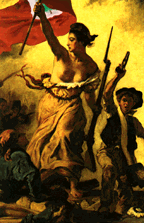 |
TODAY Wednesday 21 May 1997 Each weekday. Conn Nugent on what's new in the world, on the site. |
newsroom
 |
TODAY Wednesday 21 May 1997 Each weekday. Conn Nugent on what's new in the world, on the site. |
TODAY IN THE WORLD: We Irish
The Irish are now rich, sort of. I don't mean the American Irish, or the Australian Irish, or any of the rest of the diaspora -- we've had some money for a generation or two. I mean the Irish, the 3.6 million inhabitants of the Irish Republic. A long feature in this week's Economist describes the stunning economic development that has occurred over the past ten years.
In 1987, Irish per capita income -- as measured by Gross Domestic Product -- was near the bottom of the European Union, well below Spain's, and above only the unlucky Portuguese (Catholics all). The Irish figure was 63% of Great Britain's. In 1997, Irish per capita income is near the norm for the EU and is slightly higher than Great Britain's.
Good God. We're richer than the Brits.
Well, not really. First of all, the Celt-infested sections of the United Kingdom (Scotland, Wales, Northern Ireland) drag down the more prosperous English. And then there's the question of the measure itself: since much of the new Irish prosperity comes from foreign investment, profits on those investments are calculated as part of the Irish GDP though they're instantly repatriated to the home countries of the corporations involved. Still and all, there's been an enormous transformation, and with no visible counterforces: the Irish economy is low-debt, low-inflation, and high-productivity-growth.
There are three reasons often cited for the big change. The first is an abiding government fiscal policy that welcomes overseas capital and tamed the Irish appetite for deficit spending. The second is membership in the EU. Irish farmers are big winners with the Common Agricultural Policy, and the Irish still receive the special anti-poverty subventions that they won when they were as poor as the other Catholics. Irish civil servants are all over Brussels, so that policy may hold for a while. The third most-mentioned factor is a talented population. The Irish have invested heavily in public education (Irish schoolteachers are the best paid in Europe when salaries are measured as a percentage of the national median). The result is a young, sophisticated, computer-literate workforce. The Irish as computer geeks; who would have guessed? And here's another stereotype-buster: an Irish citizen under 35 drinks less alcohol than the average European.
One important factor not mentioned by the Economist is the aesthetic power of the Irish environment. Most Irish cities are plug ugly, but the countryside is movingly gorgeous. Scores of millions of Europeans come to the West Coast to see the wild edge of their continent, great swells of turquoise Atlantic water smashing against high cliffs of green, seabirds above, seals below. There are still real villages in Ireland, with canny natives happy to serve Germans and French in search of their pre-industrial roots. Tourism is just the half of it: surveys reveal that many of the foreign investors say that the beauty of the land was a not insignificant factor in their decision to locate (not so important as tax policy or the fact that there are a lot of Irish-extraction CEOs in the world, but still). You talk to one of these tough executives and pretty soon they're rhapsodizing about the emerald fields and the gray stone walls.
Which is, of course, not the natural landscape of Ireland. Here's a biodiversity issue for you. Once you get back a few feet from the shoreline, the look that the Irish and the rest of us love so much is basically agricultural, or at the very least pastoral. Compared to some of the monoculture operations of southern Illinois, say, an Irish farm is a biologically diverse little place. But compared to the richness of species in the great hardwood forests which once virtually covered the island, an Irish farm is a very poor thing indeed. Once again, a cold eye faces a fact unpleasant to many of us enviros: a landscape rich in biodiversity doesn't always provoke a human attachment as deep as a landscape that bears evidence of the intervention of our species.
Not to mention the evidence of ancestors. Like many a Gaelic Yankee, I dream of return, of a white cottage on a finger of land pointing west into the Atlantic, sunshine miraculously abundant, a wind machine whirring madly, all internal turmoils at bay. I can't wait to ruin the place.
TODAY ON THE SITE
There's a new feature starting today. Tom Turner, our Media Watch co-author, has come up with the attractively vulgar idea of a quiz for our readers to test their geo-smarts. So take Tom's Test -- first in a series -- and don't consult an atlas until you're done.
5/20: Shallow Backpackers
5/19: Songbirds
5/16: Fat, Fat, Fat
5/15: Our Forthright Administration
5/14: Coral Reefs of the Sahara
5/13: (Life Before) Death and Taxes
5/12: Kids
5/09: Free Trade and Hormones
5/08: Sherry Boehlert, Republican
5/07: Fort Davis, West Texas
5/06: Europe (yawn)
5/05: Divorce, Mothers, Equality
5/02: Killer Grannies and the Highway Bill
5/01: China
4/30: Pity the Mangrove
4/29: Grizzlies off Battery Park
4/28: Mighty Monsanto
4/25: Growth
4/24: Refrigerator Wars
4/23: The Day the Earth Day Stood Still
4/22: Doorman Ecology
4/21: Toyota Steps Out
4/18: Victims of Extremism
4/17: Our White Guy Problem
4/16: Coca-Cola and the Merrit Parkway